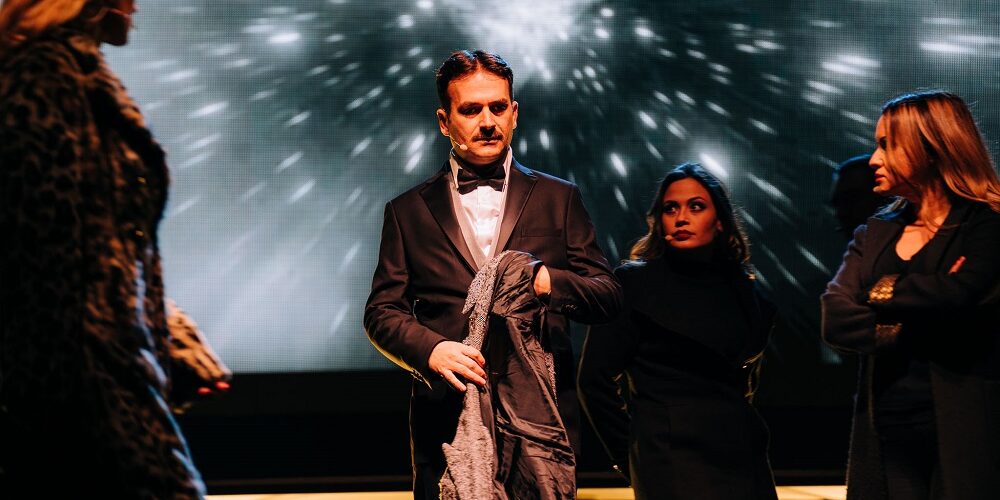Serbian National Theatre in Novi Sad and “Novi Sad – European Capital of Culture”; premiere on 22nd January 2022
Theatre almost never stages stories from history in order to accurately recreate the past. Theatre takes stories from history to metaphorically speak about the topics of the present.
This was true for Shakespeare who heavily used historical material, but had no regard for factual accuracy. He used the stories from the past to speak about political intrigues and existential questions of his time. We can see this relationship with history in the work of any number of classical and contemporary playwrights.
Nebojša Bradić, a director from Serbia and the former Minister of Culture, seems to agree with this approach, on the evidence of the show Tesla, izumetnik at the Serbian National Theatre in Novi Sad.
“The play Tesla, izumetnik isn’t a biographical reconstruction of a life, but a story that is established as a paradigm image of the contemporary world”, he explains on the theatre’s website. By using the character of the famous scientist and inventor Nikola Tesla, Bradić tells a tale of a creative genius that is hampered by society – albeit with quite a few contradictories.
The show is based on Vladimir Pištalo’s novel Tesla, a Portrait among Masks that in the very title juxtaposes Tesla’s character to the rest of society. But unlike the novel that spans the time from Tesla’s youth to his death, the dramatization (also by Bradić) focuses on Tesla’s efforts to build the Wardenclyffe Tower in New York, a worldwide wireless communication project. Since Tesla was building the Wardenclyffe Tower at the beginning of the 20th century, he’s widely seen as way ahead of his time. In the show, he puts most of his energy into persuading investors to fund the Tower, but only partially succeeds, so the Tower remains unfinished.
Although Bradić tends to build Tesla’s character as exceptional, highly intelligent and creative, an inventor-artist (the word “izumetnik” is an amalgam of these two words in Serbian), the audience attributes most of these characteristics to the main character through outside knowledge of Nikola Tesla.
The performance itself never shows us Tesla working; most of the scenes show Tesla in the high-class New York society lobbying for his project or socializing with others. If the audience wants to see the main character as a genius, they need to take his word for it, they need to believe that his projects are revolutionary, though we don’t see any evidence for this, nor does it manifest by the end of the story.
Though the show uses classical storytelling, it feels inherently non-dramatic, but not in a Brechtian or post-dramatic sense where artists break the theatrical illusion and speak directly to the audience. In Tesla, izumetnik, actors play realistically, but most of the information the audience gets is not through action, but through characters’ narration to each other, like some kind of a reverse principle of Aristotle’s Poetics.
If there’s one characteristic of the main character that doesn’t come from the audience’s imagination of the real Tesla or the characters’ obvious explanations, then it is arrogance. Bradić’s Tesla, played by Marko Marković, is so self-assured and full of himself as if he knows that he will one day be remembered by history books. When an acquaintance tells Tesla that he’s fighting windmills and that their shovels will hit him, he answers with: “or they will throw me to the stars”. This impression of arrogance is further underlined by the acting choices of Marković’s performance. He plays Tesla steadily. He’s reserved, as if he naively believes that he owns the room. All of this would have been appropriate if Tesla’s arrogance was presented as his hubris, as a tragic mistake that eventually leads to his downfall, but it feels like the director isn’t aware of his character’s arrogance, so Tesla’s Wardenclyffe Tower fails not because of his pride, rather because of unjust investors and competitors.
It might feel unjustifiable at first glance to dedicate the majority of this review to one character, even though it is the main one. But this reflects the show in which Tesla’s character is central, while the others are there to serve the function of better explaining Tesla. The investor and banker J.P. Morgan, played by Milan Kovačević, exists in the show so he can be Tesla’s antithesis, a business-minded person who cares for profit and doesn’t understand long-term scientific goals. A homeless Serbian young man Stevan (Peđa Marjanović) exists so the director can show that Tesla is compassionate because he gives him shelter and food. And Anne Morgan (Alisa Lacko/Višnja Obradović) has a function of flirting with Tesla, so the audience can see that he’s not interested in women and building a family, but in work and inventions, albeit, as I mentioned, we don’t see a single scene of him actually working.
When a director emphasizes one character to such an extent, and if that character is riddled with contradictions, then the whole performance is too. Other elements of the show are more successful, like the set design (Miodrag Tabački), a wide and empty space in the front and the middle of the scene, and a high staircase at the back. Although simple, this set can represent different settings where New York’s socialites gather at the beginning of the 20th century. The contemporary elegant high-class costumes (Staša Jamušakov) suggest that the story of Tesla’s life might be relevant today, as well as a century ago. But these elements cannot change the essence of the show – Bradić might understand that a staging of Tesla’s life has importance in the modern-day, but somewhere in the process, he forgot what exactly he wanted to say about Tesla, about us.
Credits
Director: Nebojša Bradić
Scenography: Miodrag Tabački
Costumes: Staša Jamušakov
Cast: Marko Marković, Milan Kovačević, Peđa Marjanović, Alisa Lacko, Višnja Obradović
Main image: V Velickovic
Further reading: Consent at Atelje 212, directed by Nebojša Bradić,
Borisav Matić is a critic and dramaturg from Serbia. He is the Regional Managing Editor at The Theatre Times. He regularly writes about theatre for a range of publications and media.
He’s a member of the feminist collective Rebel Readers with whom he co-edits Bookvica, their platform for literary criticism, and produces literary shows and podcasts. He occasionally works as a dramaturg or a scriptwriter for theatre, TV, radio and other media. He's the administrator of IDEA - the International Drama/Theatre and Education Association.








